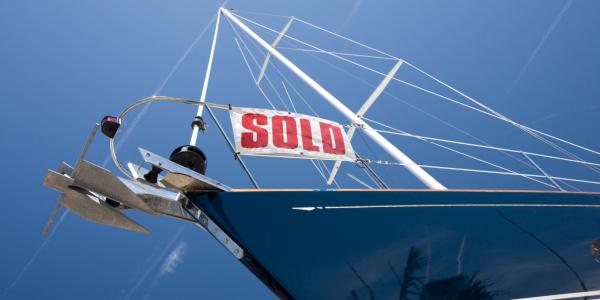Learn how to register your boat in Washington state.
Before you get started
Unless specifically exempt (see below), you must meet all Washington state registration requirements when using a documented boat on Washington waters. This means:
- You have 60 days to register your boat after you move to Washington
- You have 15 days to register your boat in Washington if you buy it in another state
If your boat is documented with the U.S. Coast Guard
If your boat is registered with the U.S. Coast Guard, you must meet special registration requirements. Learn more about the requirements for documented boats.
Commercial fishing boats
If you use your boat exclusively for commercial fishing, you must register it with the Washington State Department of Revenue.
How to register your boat
To title and register your boat in Washington:
1. Gather all the required documentation
Gather all of the following:
Vessel Title Application
Complete the Vessel Title Application on white paper. If you bought the boat at a dealership, they'll complete this form for you.
Your current out-of-state registration
If your boat isn't currently registered in another jurisdiction, please contact a vehicle and boat licensing office for instructions.
The out-of-state title
- If there is a lienholder, bring a photocopy of the out-of-state title
- If you don't have your out-of-state title, contact a vehicle and boat licensing office for instructions
Proof you paid sales tax on the boat
If you don't have proof that you paid sales tax when you purchased it, you may need to pay use tax when titling/registering your boat.
Proof of insurance (if necessary)
If your boat is more than 35 feet long and more than 40 years old, you must present proof of marine insurance when you transfer the title into your name or register it for the first time. You only have to do this once.
You may provide more than one policy to meet all of the following requirements. The insurance policy (or policies) must:
- Be for at least a 12 month term from the time the boat changed ownership
- Include $300,000 or more basic coverage
- Include a provision for removing the boat if it sinks or causes pollution
Contact a vehicle and boat licensing office if you have questions about whether your policy meets the requirements.
The payment/fee
Bring a check or money order payable to the Department of Licensing. Some vehicle licensing offices may take card payments, but many do not. Check with your local vehicle licensing office for details. Calculate your boat registration fees.
2. Submit your paperwork
You can submit your paperwork and the required fees in person at a vehicle and boat licensing office or by mail.
3. Properly display your decals and registration
When you've registered your boat, you'll get your registration and a set of decals with the assigned registration number (WN#). You'll also get vessel registration number instructions showing how to properly display the registration number and decals on your boat.
If you register by mail, you'll get them in the mail. If you register at an office, the licensing agent will give them to you before you leave.
Exempt boats
- Canoes, kayaks, or boats that don't have a motor or sail (strictly human-powered)
- Boats held for sale by a licensed dealer
- Military boats
- Public boats of the United States or the American Red Cross
- State-, county-, or city-owned boats which are used for government purposes
- Tugs with a marine document as a boat of the United States that are primarily engaged in commerce
- Barges with a marine document as a boat of the United States that are primarily engaged in commerce
- Bare boat charters or timeshare boats with a marine document as a boat of the United States that are primarily engaged in commerce
- Boats with propulsion machinery that draw 250 watts or less, propel the boat no faster than 10 miles per hour and are not used on waters subject to the jurisdiction of the United States or the high seas beyond the territorial seas for boats owned in the United States.
- Boats less than 16 feet long with a motor of 10 horsepower or less which are only used on non-federal waters
- Tenders 10 HP or less used for direct transportation between a registered boat and the shore and for no other purpose. The tender must display the number of the registered boat followed by the suffix "1".
- Boats 30 ft. or longer purchased by a nonresident that has purchased a use permit
- Boats primarily engaged in commerce that is owned by a resident of a country other than the United States
Boats registered in another state
If your boat is registered in another state, you are exempt for the first 60 days you are on Washington waters. On or before the 61st day of use on Washington state waters, you (or the owner) must obtain a nonresident boat temporary license plate as required by law.
If the boat's primary place of use changes to Washington, you must register it in Washington.
Boats issued a United States Customs Service Cruising License or registered in another country
If you have a US Customs Service Cruising License or if your boat is registered in another country, you are exempt for the first 60 days you are on Washington waters.
On or before the 61st day of use on Washington waters, you (or the owner) must obtain a boat visitor temporary license plate.
Boats in Washington exclusively for repairs, alteration, or reconstruction
If you live out of state and your boat is on Washington waters for repairs, alterations, or reconstruction:
- You must file an affidavit with the Department of Revenue by the 61st day to verify the boat is being serviced
- You must file a new affidavit every 60 days as long as the boat is located on Washington waters
Note: An employee of the repair facility providing these services must be on board the boat during any testing.
Long-term moorage (over 30 days)
If you moor your boat over 30 days, you must give your moorage provider one of the following:
Option 1
- Proof of boat registration, and
- A written statement of intent to register your boat
Option 2
A completed Vessel Registration Exemption form.
Clean your boat before you float
To prevent the spread of aquatic nuisance species, you must properly decontaminate your boat, trailer, and gear before entering Washington. Learn more about aquatic invasive species (Department of Fish and Wildlife).
Related laws
- Exemptions—Vessels sold to nonresidents (RCW 82.08.700)
- Exemptions—Vessels sold to nonresidents (RCW 82.12.700)
- Nonresident vessel permit (RCW 88.02.620)
- Vessel visitor permit (RCW 88.02.610)




